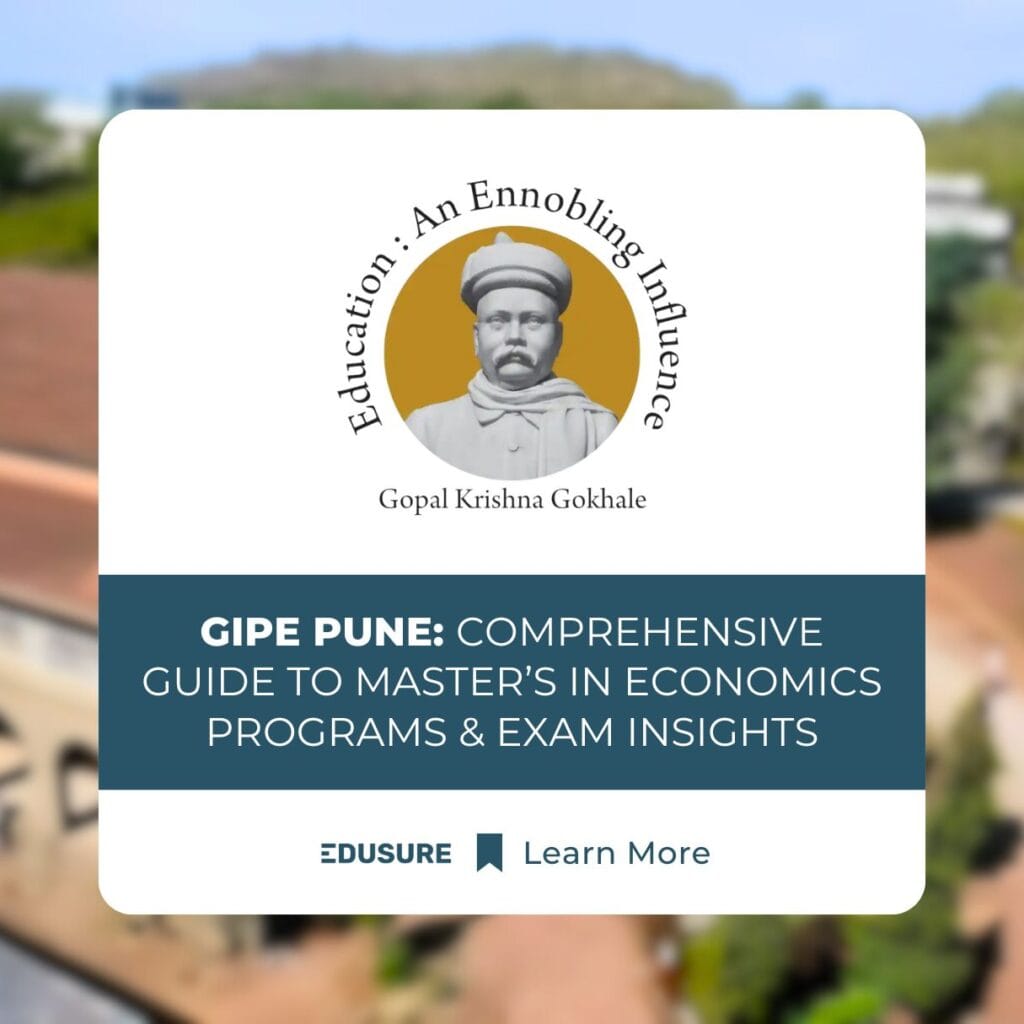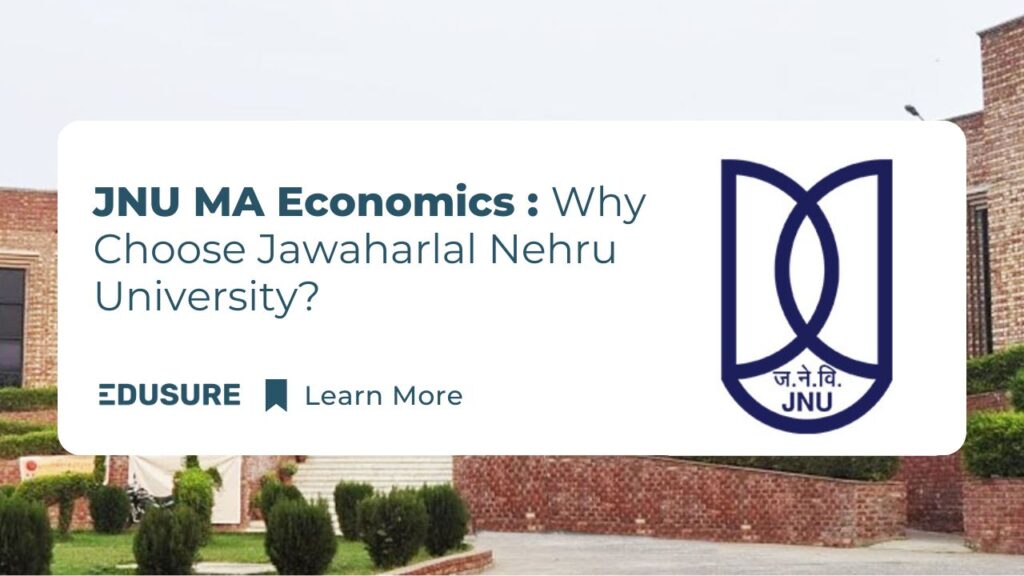
Admission is through the CUET-PG entrance exam.

The JNU MA Economics program, specializing in the World Economy, is a comprehensive two-year full-time course. It equips students with a solid theoretical foundation in economics and practical analytical skills. The program focuses on key global issues, including trade, technology, environment, natural resources, development, currency and finance, regulatory economics, and information economics.
JNU’s MA Economics program is renowned for its academic rigor and excellence. The program is designed to provide students with a deep understanding of economic theories, quantitative methods, and applied economics. The faculty at JNU comprises some of the most respected economists in the country, ensuring that students receive top-notch education and mentorship.
JNU is known for its strong emphasis on research. The MA Economics program offers numerous research opportunities, allowing students to work on cutting-edge projects under the guidance of experienced faculty members. This research experience is invaluable for those looking to pursue a career in academia or policy-making.
JNU boasts a network of distinguished alumni who have made significant contributions to the field of economics. Graduates of the MA Economics program hold prominent positions in academia, government, and international organizations, reflecting the high quality of education and training they received at JNU.
Keep scrolling to know all about the JNU MA Economics benefits. Are you planning to give the JNU MA Economics CUET Entrance Exam? Check our Brand New CUET Crash Course and make your dream come true!
The program spans two years, divided into four semesters. Students are required to complete nine core courses and seven optional courses, each carrying 4 credits. The curriculum is designed to equip students with the necessary tools to understand the evolution of the world economy and prepare them for advanced research work or professional roles in government, non-governmental organizations, and the corporate sector.
For JNU MA Economics eligibility, candidates must have:
(i) A Bachelor’s degree in Economics (Honours) with at least 50% marks in aggregate; or
(ii) Any other Bachelor’s degree with at least 60% marks in aggregate and Economics as a subject. Mathematics at the level of 12th standard is compulsory.
The admission process for JNU MA Economics involves an all-India written test (CUET PG) that evaluates candidates’ knowledge in microeconomics, macroeconomics, mathematics, and statistics.
Admission to the program is through the Common Universities Entrance Test (CUET) – PG. The test assesses candidates’ knowledge in relevant subjects and their analytical skills. Previous question papers and solutions are available on our site.
The placement statistics for the batch 2022-24 highlight the success of the program in facilitating outstanding career opportunities. The maximum package offered was ₹14.15 LPA, with a mean package of ₹11.4 LPA, a median of ₹12.5 LPA, and a mode of ₹14.15 LPA, reflecting consistent high-paying opportunities. A total of 23 students were successfully placed across 9 hiring companies.
Sector-wise, the placements were distributed as follows:
Graduates have also achieved remarkable academic and professional success, pursuing higher studies at globally renowned institutions like LSE, Princeton, Yale, Rochester, NYU, and Ohio State. Additionally, they have received lucrative job offers from prestigious organizations such as GE, HSBC, ICICI, Infosys, American Express, Exim Bank, CII, and Churchill India.
The program’s placement process is spearheaded by a dedicated and active placement cell run by students themselves, ensuring seamless facilitation of job placements. These achievements underscore the program’s commitment to excellence and its ability to shape successful career trajectories for its graduates.
The tuition fees for the program is given below:
| Fee Component | M.A./M.Sc. |
| Tuition Fee (Annual) | Rs. 216.00 |
| Sports Fee (Annual) | Rs. 16.50 |
| Literary & Cultural Fee (Annual) | Rs. 16.50 |
| Library Fee (Annual) | Rs. 6.00 |
| Medical Fee (Annual) | Rs. 9.00 |
| Medical Booklet | Rs. 12.00 |
| Students Aid Fund (Annual) | Rs. 4.50 |
| Admission Fee | Rs. 5.00 |
| Enrolment Fee | Rs. 5.00 |
| Security Deposit (Refundable) | Rs. 40.00 |
| Identity Card Folder | Rs. 10.00 |
| Student Hostel and General Information Guide | Rs. 15.00 |
| National Service Scheme (NSS) | Rs. 20.00 |
| Chief Proctor Office Manual | Rs. 45.00 |
| Total Fee (Anual) | Rs. 420.5 |
Admission Intake:
M.A. Economics (World Economy specialization)
JNU SIS: 39 seats
JNU SSS: 96 seats
Please note that hostel facilities are limited and provided by the university on a restricted basis.
To succeed in the CUET PG Economics entrance exam for JNU’s MA Economics admission, you need a strategic approach. Here are some helpful tips:
Suggested for you
Looking for guidance in tackling tough topics in economics? Edusure’s MA Economics coaching is an excellent resource for mastering concepts and excelling in your coursework.
Are you planning to take the CUET PG 2025 entrance exam for MA Economics at JNU ? Check our Flagship Course for CUET PG Entrance Exam and make your dream come true!
Enhance your preparation for the CUET PG entrance exam for MA Economics at JNU with a personalized, one-on-one counselling session led by our distinguished senior student counsellor, Mr. Nitesh Rao. With over a decade of expertise, Mr. Nitesh provides exceptional guidance to help you achieve success. Secure your session now for invaluable insights and tailored advice
Looking to ace the CUET PG Entrance Exam 2025? Access our exclusive free resources to boost your preparation! Simply click on “Get the CUET PG Free Resources Now” to get started.
Evaluation and Grading
The program requires a minimum of 64 credits over four semesters, extendable by two extra semesters if needed. Evaluation includes mid-semester and end-semester written examinations, class presentations, and term papers. Special emphasis is laid on developing students’ articulation skills.
Core Courses
The core courses in the JNU MA Economics program are designed to provide a strong foundation in economic theory and quantitative methods. These courses include:
Microeconomic Theory: This course covers the principles of microeconomic analysis, including consumer behavior, production theory, and market structures.
Macroeconomic Theory: This course focuses on macroeconomic concepts such as national income, inflation, unemployment, and monetary and fiscal policies.
Econometrics: This course introduces students to econometric techniques used for empirical analysis in economics.
Mathematical Methods for Economics: This course covers mathematical tools and techniques essential for economic analysis.
Elective Courses
In addition to the core courses, students can choose from a wide range of elective courses that allow them to specialize in areas of interest. Some of the popular elective courses include:
Development Economics: This course examines economic development issues, including poverty, inequality, and growth strategies.
Public Economics: This course explores the role of government in the economy, including taxation, public expenditure, and welfare policies.
International Trade: This course analyzes the theories and policies of international trade and finance.
Environmental Economics: This course focuses on the economic analysis of environmental issues and policies.
Research and Dissertation
A significant component of the JNU MA Economics program is the research and dissertation requirement. Students are required to undertake a research project and submit a dissertation based on their findings. This experience helps students develop strong research skills and gain a deeper understanding of their chosen field.
Prominent Alumni
JNU has a vibrant alumni network, with many of its graduates holding prominent positions in academia, government, and industry. Here are a few notable alumni:
Dr. Arvind Subramanian: Former Chief Economic Advisor to the Government of India
Dr. Rathin Roy: Director, National Institute of Public Finance and Policy
Dr. Ila Patnaik: Economist and Columnist
Alumni Network
The JNU alumni network is an invaluable resource for current students and recent graduates. Alumni often return to the university to share their experiences, provide mentorship, and offer guidance to aspiring economists.
The JNU MA Economics program presents a unique opportunity to delve deeply into the field of economics at one of India’s most prestigious universities. Featuring a rigorous curriculum, distinguished faculty, and excellent career prospects, JNU is an ideal place for aspiring economists. By following the tips and strategies outlined in this guide, you can enhance your preparation for the CUET PG Economics entrance exam and secure your admission to the JNU MA Economics program in 2025, setting yourself up for success in both your academic and professional journey.
Embarking on your journey to JNU, you will pave the way for a successful and fulfilling career in economics. The comprehensive training, research opportunities, and strong alumni network will equip you with the skills and knowledge needed to excel in your chosen field. With dedication and hard work, you can achieve your academic and professional goals, becoming a part of the esteemed JNU legacy. Embrace this opportunity, and let JNU be the launchpad for your future success.
A Bachelor’s degree in any discipline with at least 50% marks. Knowledge of Mathematics at the 10+2 level is expected.
Admission is through the CUET-PG entrance exam.
The program spans two years, divided into four semesters, with nine core courses and seven optional courses.
Graduates pursue higher studies or receive job offers from top corporates like GE, HSBC, ICICI, and Infosys.
Approximately ₹420 per year
Yes, a specialization in the World Economy.
Evaluation is based on written exams, class presentations, and term papers.
Take advantage of a free trial class to experience our teaching methods, gain insights, and see how we can support your learning.
Got to know all about the DSE MA Economics benefits ? Are you planning to give the DSE MA Economics CUET Entrance Exam? Check our brand new Crash Course Course and make your dream come true!
Suggested for you
EduSure has one of the best and the most structured programmes to crack the Masters in Economics Entrance Exams. It’s a 14-year-old Institute with students having Rank 1 in DSE, JNU, IGIDR, and IIT amongst other exams consistently in the last few years.
To see student testimonials of EduSure and hear about their success : www.youtube.com/edusureschool
To speak to an EduSure student counsellor, please fill out this Enquiry Form or call on 8100824600/01
For course enrolment, drop in your details on https://edusure.in/contact/ and we shall get back to you!
Ask a Question: edusureschool@gmail.com
Subscribe: https://www.youtube.com/c/EduSureSchool
Instagram: https://www.instagram.com/edusureschool/
Quora: https://www.quora.com/profile/EduSure-School
Facebook: https://www.facebook.com/Edusure?mibextid=ZbWKwL
We hope this was helpful.
Happy Learning!!

Full information PDF on MA Economics Entrance preparation in India
Get personalized advice on the best coaching for an MA in Economics. Click below to schedule a FREE counseling session with our expert advisors and explore available slots today!
Follow Us Now on

EduSure School is a 14+ year institute, with ISI/DSE faculty, Solely focused on MA Economics Entrance Exams.
WhatsApp us